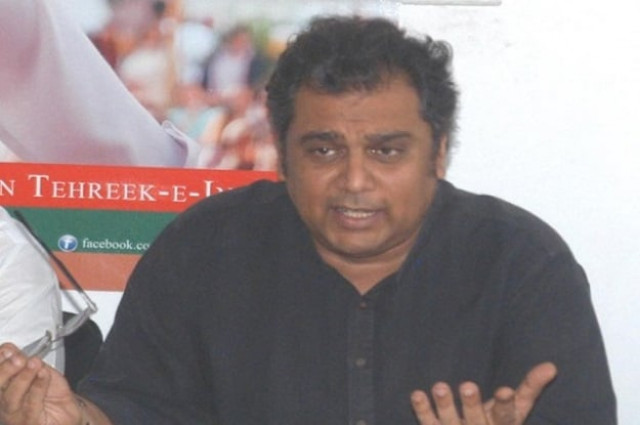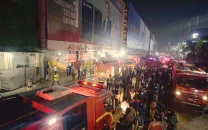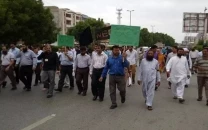PTI to argue on maintainability of right to information plea
Party wants JIT reports to be made public

PTI leader Ali Haider Zaidi filed the petition seeking the information. PHOTO: NNI
Headed by the Justice Naimatullah Phulpoto, a two-judge bench directed the lawyer representing the petitioner to satisfy the court on the maintainability of the petition on the next hearing fixed for October 25.
PTI had approached the court against the provincial chief secretary for not providing them reports of the joint investigation teams (JITs) that had investigated the Baldia factory fire, Lyari kingpin Uzair Baloch’s case and cases against the former chairperson of the Fishermen Cooperative Society, Nisar Morai, under the Right to Information Act, 2011.
PTI ask SHC to unveil reports on Baldia fire, Uzair Baloch
A day earlier, the police had filed Uzair’s confessional statement before a judicial magistrate, in which he had made startling disclosures about committing criminal activities in connivance with senior leadership of the Pakistan Peoples Party (PPP) and police officers.
The gangster had named former president and PPP Co-Chairperson Asif Ali Zardari, his sister MNA Faryal Talpur, Senator Yousuf Baloch, former Senator Faisal Raza Abidi, former minister Sharjeel Inam Memon, former Karachi city police chief Waseem Ahmed, SSP Farooq Awan, his brother and current prosecutor-general Shahadat Awan and others in his statement.
Filing the petition, PTI leader Syed Ali Haider Zaidi said the Sindh Assembly had passed the Right to Information Act, 2011 and he had exercised his right to obtain information in line with the Act by making several requests to the chief secretary to provide copies of the JIT reports but the respondent failed to provide the information.
The petitioner, represented by Barrister Muhammad Umer Soomro, said the families of the victims of the Lyari gang war, Baldia factory fire and crimes committed by Morai deserved justice and action should be taken against the real culprits. However, due to the concealment of the JIT reports they were unaware of the culprits involved in these crimes.
Uzair Baloch spills the beans
"The publication of the JIT reports is important to ensure that the true culprits are not able to evade justice," he argued and cited that the print and electronic media had reported that during investigations the JITs had obtained evidence suggesting the involvement of various politicians in these crimes.
Zaidi argued that it was imperative that such persons be held accountable for their actions. However, he apprehended that so long as the complete JIT reports were kept secret, the involvement of these politicians in these crimes will not be known to the public, leaving the politicians to quietly exercise their influence and quash any investigations launched against them.
"The publication of the JIT reports is important as there are allegations that state machinery was utilised to commit and/or cover up crimes and the people have a right to know if public resources were used for this purpose," he argued.
The petitioner said the very purpose of constituting the JITs, which were formed to uncover the truth of these crimes, will be defeated if the reports were allowed to remain secret.
The Uzair Baloch confession
Barrister Soomro argued that the JIT reports were required to be made public under provisions of the Sindh Transparency and Right to Information Act, 2011, however, the same had not effectively been implemented.
He cited that the precedence of requiring investigation reports to be made public had been set by the Lahore High Court, which had, on September 21 of this year, ordered that the report of Justice Ali Baqar Najfi to be made public in respect of the Model Town massacre in Lahore.
The petitioner argued that the failure of the Sindh authorities to make the JIT reports public was a violation of the right to information guaranteed under Article 19-A of the Constitution.
Therefore, the court was pleaded to direct the respondents to publicise and also provide official copies of the reports prepared by the JITs constituted to investigate the Uzair Baloch, Baldia factory fire and Nisar Morai cases.
‘There are more Baldia factories waiting to explode’
Justice Phulpoto questioned the maintainability of the petition, observing that the Pakistan Awami Tehrik (PAT) was the aggrieved party in the Model Town incident. He questioned how the petitioner was aggrieved in these inquiries.
Barrister Soomro argued that the petitioner was a resident of Karachi and held a key post in his party, therefore, he was also affected by these incidents. However, the judges told the lawyer to argue on the maintainability of the petition on the next date of hearing. In the meanwhile, they issued notices to the provincial advocate-general and chief secretary to file their comments on the petition by October 25.



















COMMENTS
Comments are moderated and generally will be posted if they are on-topic and not abusive.
For more information, please see our Comments FAQ